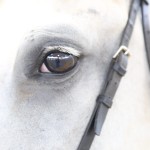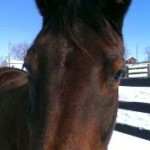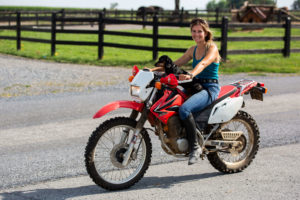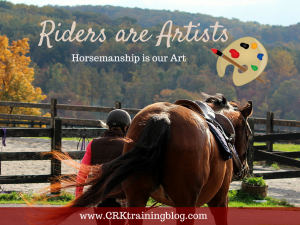Do you ever wish you could spend a day seeing the world as your horse does?
To experience how they think, how they learn, and how they feel.
I’ve always been fascinated by how different individuals, people or animals, think and learn. In today’s video, I’m going to discuss the intelligence and cognition of horses, but not in the way you might expect.
Intelligence used to be measured with a standard linear method, think high or low IQ. But now, we have an expanded view of what intelligence can mean, and that’s important when considering “how smart is my horse?”
Hit play below to watch the video and learn how intelligent your horse may be.














25 Responses
Loved this. It has broadened my view on horse’s intelligence. Thanks.
Great topic. It is interesting to consider how horses and other animals learn both the things we want them to learn and the things we’d rather they didn’t learn. It is always good to consider the “payoff”, and what is maintaining the behavior. I have old-fashioned thumb latches on the doors in my old house; the cat learned to open interior doors from one side by pressing down on the thumb latch with a paw. The dog learned to open the doors from the other side by lifting up a lever that protruded through the door. Purely trial and error learning on their part!
Loved this! Thanks Callie!
I’m feeling dumber by the minute. Keep up the good work!
Callie, thank you, but you must teach your horse to spell properly.
Yes… different types of intelligences, apparently mine is not in spelling…
Nice talk! Just a little editing note, mathematical has an “e” in it!
Oops! The whiteboard didn’t have a spell checker!
Thank you Callie. You make things so easy to understand. I think animals (horses in particular :)) are extremely intelligent. Sometimes we as humans need to open our minds to be able to see it.
Thank you for broadening the minds of all of us, with what we all can bring to the table and
view our equine/ canine friends…
It is funny how we humans think of us as intelligent. Just looking at how the world is going I wonder if we really are that intelligent.
I loved how you descripted intelligence has many different ways.
Great video, as always! It made me think of a book called The Seven Intelligences a while back…
Interesting, I’ll have to look that one up!
Oops, I think it is The Nine Intellegences…
Great topic! I just started reading Animals in Translation by Temple Grandin. She has spent years studying animal cognition and behaviors. Fascinating! Thanks, Callie!
Temple is amazing! I love her books too!
I was wondering if you have seen any relationship between Alpha, Curious and Sex in regards to the ability to problem solve. I have two Alpha mares, (one in her 30’splaeno longer heard Alpha and her replacement, I’ve had since a one week filly) The later would leave her Dam’s side to check things out all the time. Both have figured out how to open latches of all types and will do so as a matter of fact regardless of the latch complexity. I have 4 other horses that don’t have any drive to figure out problems (two pony mares, a OTTB (gelding) & a Mustang (gelding)… Most videos of horses opening latches seem to be of Mares… Would be interesting to see if there is any relationship between Position, Curiosity & Sex.
That would be an interesting study!
Thanks callie.your presentation was really good.great topic to understand.keep us updated.thanks again.
LOVE… LOVE… LOVE … all the videos you make Callie…. and all that you do to help us all to be better riders and carers of wonderful calm horses.
I can’t thankyou enough for all that you have provided so far…. These videos are priceless and brilliant!!
Wish I was in America closer to where you are so that I could attend the clinics you conduct. I am just a little far away though … in Australia.
Keep up the fantastic work Callie and know that you are very valued of this side of the planet for all you do!!!
Love Love Love your work.
Kind regards
Liz and Lilly the Clydesdale
Thank you Liz!
I am challenged by this because many trainers have told me that Maggi doesn’t have a good work ethic–that she is lazy. But they will also tell me that she is the smartest horse they have ever seen. And so, they conclude, she is so smart that she knows how to try to get out of working. This kind of confuses me. How do I deal with a smart horse who doesn’t want to work? Or is the theory of all these trainers somehow incorrect?
That is a really interesting question! I hope Callie responds with an answer. I would question though whether any horse really has a work ethic–at least as we apply the term to humans. In my limited experience, it does seem like there is a difference between horses in how much they willingly exert themselves and how much they elect to save their energy. If your horse has learned to act in ways that get her out of work, I suppose you could say that she is “smart”, but mainly I think operant conditioning is at work. For example, you ask for a canter, she bucks, you stop asking for the canter, she gets out of harder work.
Lynn: I agree about the work ethic. But this is the “stigma” that seems to flourish in this area concerning Halflingers. I wonder if they are just so smart that they get bored. You are right about operant conditioning. However, sometimes my mare gets so adamant about not doing what I want, which is usually trotting, that she will buck and back up, no matter how consistent the aids. She will eventually do what I ask, but I would like to eliminate the struggle. It could very well be that I am doing something “wrong” although I have agreed to let other more advanced riders try, and they usually have the same issue. After the “fight,” she will usually move on, but that’s no fun!
Lol! I have 2 that everyone at the barn knows not to let them see how to open gates. The one also used to be called the “fence tester” because she knew when the electric was down and would get the fence down and let the herd into the hay field. And some definitely are very empathetic- knowing your mood and even trying to console.